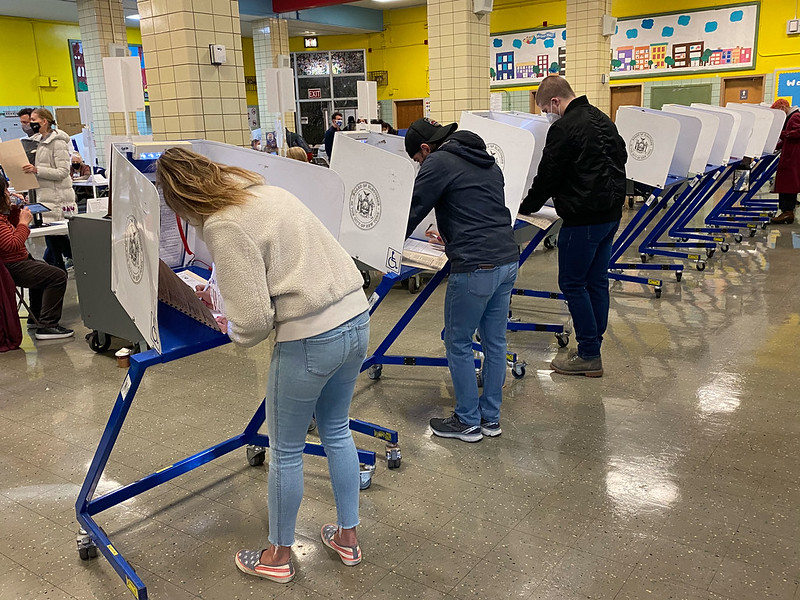
Voters in the West Village (photo: Michael Appleton/Mayor's office)
In this week’s late August primary, the second primary this summer in New York, voter turnout barely cracked ten percent in New York City. The first primary of the summer, in June, saw turnout drop by nearly half from four years ago. At the same time, nationally, concern about the future of democracy in the United States is at fever pitch. In 2021, for the first time, the US was added to an annual list of “backsliding” democracies - compiled by the International IDEA think tank. If our democracy is in peril, why aren’t New Yorkers voting like their rights depended on it?
In fact, within the seeming disconnect is a key part of the solution: building our democracy back up from the roots. From the block, to the neighborhood, to the city, and beyond.
GoVoteNYC, a collaborative of more than a dozen foundations and donors committed to nonpartisan activity to strengthen democracy in New York City, is an eager contributor to this work. GoVoteNYC supports nonprofit partners that are deploying both creative new ideas and proven approaches to reach voters, many of whom have not voted in the past or are typically overlooked in the democratic process.
 In 2021, GoVoteNYC provided $1 million in grants to nonprofit partners across New York City. These grantees, trusted messengers in their communities, engaged, informed, and mobilized their neighbors and communities to get out the vote.
In 2021, GoVoteNYC provided $1 million in grants to nonprofit partners across New York City. These grantees, trusted messengers in their communities, engaged, informed, and mobilized their neighbors and communities to get out the vote.
According to an analysis conducted for GoVoteNYC by Hester Street, an urban design and community development nonprofit, these activities conducted in eight languages reached over two million New Yorkers across all boroughs. Thanks in part to these efforts, turnout in the 2021 mayoral primary saw the highest voter turnout in any mayoral primary in the last several decades, but turnout slumped in the 2021 general election.
What did we learn from this work in 2021? Put simply, investments in three areas paid off: the three V’s for voter engagement: validators, volunteers and visibility.
First, validators. The Hispanic Federation created a coalition of community-based organizations that met bi-weekly to discuss election information, coordinate activities, and promote their election events. Three hundred thousand Latino voters were reached with support from coalition members. Of note, sixty one percent of people contacted by the Hispanic Federation had not voted in the last three primaries.
Second, volunteers. MinKwon Center, which organizes low-income Korean and Asian immigrant communities, mobilized a network of 527 volunteers to support their GoVoteNYC-funded outreach. The result was a sixty percent increase in Asian-American primary voters in 2021 from 2013 in the eight council districts targeted by MinKwon and the APA VOICE Coalition.
Third, visibility. F.Y. Eye, a nonprofit media agency, created a Voting PSA Clearinghouse, a free, accessible, open-source library that aggregated content like flyers, explainers, posters and social media posts around voting in the primary and general elections. In 2021, the focus was explaining Ranked Choice Voting. GoVoteNYC grantees garnered 79 million impressions with their voter education ads. This year, as New Yorkers faced new districts, two summer primaries and 86,500 of us had our voting sites changed, the need for nonpartisan accurate voter education remains significant. In 2023 we will see another set of boundary changes, this time for the City Council.
The key is consistently deploying these tools in combination. As a result of our grantees’ work in 2021, and a new set of grants for 2022, we are hopeful, and we invite other civic, philanthropic and corporate leaders to join us. While our national system creaks and groans, our democracy is being reinforced and rebuilt by community groups working together in every neighborhood in New York City. If New Yorkers cannot cultivate and sustain healthy democratic participation locally, how can we expect or entertain anything different nationally?
***
Martha King is a Senior Program Officer at the Charles H. Revson Foundation. Patricia A. Swann is the Program Director, Thriving Communities at the New York Community Trust. Neill Coleman is the Executive Director of Trinity Church Wall Street Philanthropies. Together they serve as the co-chairs of GoVoteNYC. On Twitter @Revson_Fdn & @NYCommTrust & @neillcoleman of @TrinityWallSt.
***
Have an op-ed idea or submission for Gotham Gazette? Email This email address is being protected from spambots. You need JavaScript enabled to view it.




